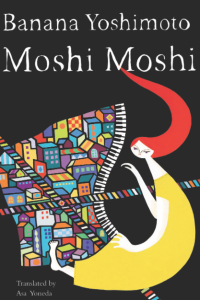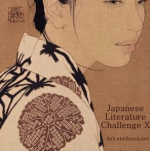
A few years ago, I used to read every book by Banana Yoshimoto. With the exception of Goodbye Tsugumi, I liked or loved them all. Why did I stop reading her you may wonder? Because her best books are very similar. She returns to the same topics and themes again and again and while these are themes I’m drawn to, I still felt I needed to wait a little before returning to her.
Moshi Moshi tells the story of twenty-year old Yotchan whose father, a musician, has committed suicide together with another woman than his wife. Yotchan and her mother are devastated and trapped in their grief. Yotchan had just graduated from a culinary school and wanted to open her own restaurant. Grief and the realization she might not be ready makes her rethink her plan. Watching Ichikawa Jun’s film ‘Zawa Zawa Shimokitazawa, she decides that changing the neighbourhood and moving from Tokyo’s posh Meguro district to the colourful Shimokitazawa neighbourhood might help her.
During the day, Yotchan works in the bistro of a friend, in the evenings she explores Shimokitazawa. One day, her mother stands in front of her door and tells her she will move in. Yotchan isn’t happy about this but she agrees anyway. Yotchan is afraid that her mother might interfere with her life but she shouldn’t have worried. Her mother too, wants to change, shed her old self, find new meaning.
Both women begin to enjoy life again, but the dark mystery surrounding her father’s death still weighs heavy on both. Without telling her mother, Yotchan investigates and finds out that he woman with whom he committed suicide was a very dark person. Charismatic in a destructive way.
It takes Yotchan and her mother the whole book to come to terms with the suicide of their beloved father and husband, but when they do, they have found a way to integrate him into their life and, at the same time, leave their old life behind.
I loved this novel. It’s beautiful and melancholic, a celebration of the transitoriness of life and of what the Japanese call “exquisite sadness”. Shimokitazawa is described as a very lively place. Full of bistros, cafés, restaurants that attract artistic, bohemian people. Since Yotchan is a chef, she’s particularly attracted by the culinary side of this neighbourhood. It was fascinating to read about her trips to restaurants and cafés which included the descriptions of the places and the food. There’s such a wealth of food in this book, none of which I’ve ever tasted. All I know of Japanese cuisine is Miso soup, Sushi and Ramen. Not one of these is ever mentioned. I loved that because it introduced me to what the Japanese really eat.
Yotchan, who is the first person narrator of this novel, is a lovely character. She’s enthusiastic and keenly aware of the people and places around her. Her appreciation of beauty and the fleetingness of things infuses the story with a bitter-sweet mood.
I don’t want to spoil the book, so I won’t go into any details, but there a few very beautiful descriptions of locales, places and trees which by the end of the book will not exist anymore.
Banana Yoshimoto has a knack for capturing fleeting beauty, for using unusual, eccentric characters and situations. She’s also known for writing about death and the influence of the dead on the living. This book contains all of that and more. Because it is longer than most of her other books, the reader has time to get fully immersed in this world. I was sad when I finished the book. It reminded me of a time when I was twenty and, like Yotchan, knew that many of the people and places I loved would possibly not stay in my life forever. It’s peculiar to look back and remember this odd clarity. Maybe this happens to most people at that age. Like Yotchan, I enjoyed the company of some people and at the same time I knew, I would move on.
It takes a lot of skill to write about the sad aspects of life but to do so in a way that is uplifting, that doesn’t shy away from describing futility but in doing so guarantees that what is gone is not forgotten but won’t trap you in the past.
Since I liked this so much, I was glad to discover that I had another one of her novels, Amrita, on my piles.
I read the German translation of Moshi Moshi that’s why I didn’t add any quotes. I wonder if the English edition contains as many footnotes as the German translation. I was thankful for those footnotes as they explained the food that was mentioned and some expressions I wasn’t familiar with.
Until now, Kitchen was my favorite Yoshimoto novel, but I liked this one just as much.

This review is my second contribution to Bellezza’s Japanese Literature Challenge X
Here’s the review list.
